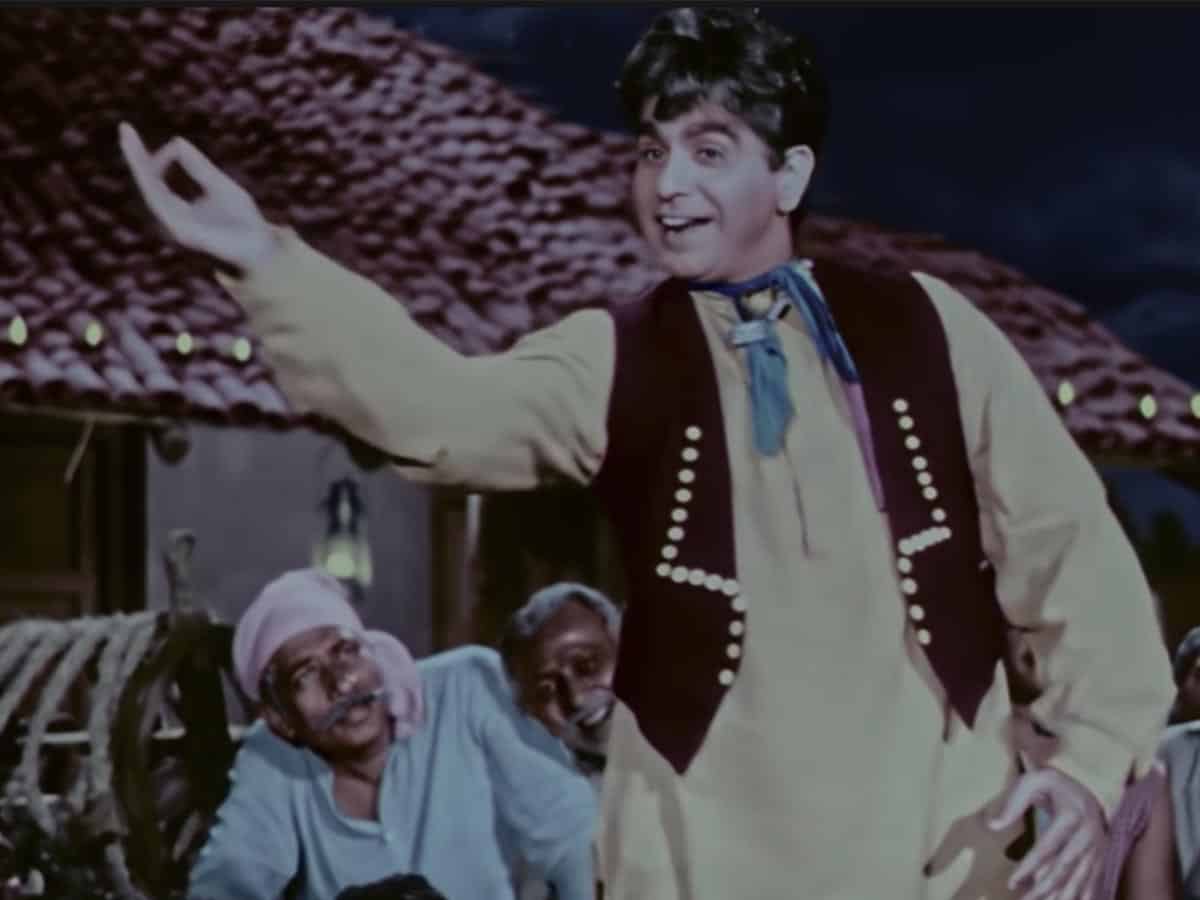
Since the dawn of art and literature, many poets have written in glowing praise about the lustrous hair of beautiful women. In films too this aspect of their beauty has often been lauded. But seldom if ever, has any importance been given to a man’s attractive hairstyle. In Bollywood, the only exception to this rule was Dilip Kumar. That happened when a song from the film Naya Daur (released in 1957) was picturised wherein some of the lines sung by Vyjayanthimala on the screen (duet sung by Asha Bhonsle and Mohd. Rafi) said: “Uden Jab Jab Zulfen Teri, Kunwariyon Ka Dil Machle” etc. The noted thespian about whom the lines were sung passed away exactly a year ago after a prolonged illness.
Saira Banu referred to this fact in an interview several years ago. Saira Banu told the interviewer: “I saw him for the first time at Mumbai’s Mehboob Studios. He was wearing a plain white shirt, white trousers and white chappals. And my God! He had such lovely free flowing hair. Just in sync with the song Uden Jab Jab Zulfen Teri from the film Naya Daur. I fell in love with him instantly. I was only 12 years old then.”
Film critic Roshmila Bhattacharya who has had more than three decades of experience and has written for leading publications such as the Times of India, Hindustan Times and the Indian Express, has brought some interesting facts about Dilip Kumar in her book titled Matinee Men.
The journalist interacted with the actor many times. On the latter’s 85th birthday, she asked Dilip Kumar which was the most important day of his life. To this query Dilip sahab related an interesting story. He told her that the day he was born was his most memorable day because a fire had broken out in the neighbourhood of Qissa Khwani Bazar in Peshawar where his home was located. Due to the commotion it took the midwife a lot of difficulty and delay to reach the house and help his mother Ayesha Begum with the delivery. According to Dilip Kumar, who heard about it from his elders, that day was the most dramatic day of his life.
In a long and interesting career in films, Dilip Kumar went through many ups and downs. His father Lala Ghulam Sarwar Khan was against the idea of his acting in films. The conservative Lala was a practical person who disliked the make-believe world of cinema. In fact he was also displeased that his good friend Lala Basheshwar Nath Kapoor had allowed his son Pritiviraj Kapoor to enter the film industry. The two families lived close to each other in Peshawar and were friends for many years. But little did Lala Ghulam Sarwar Khan know that the Kapoor family was destined to become one of the leading clans in Bollywood later.
It was the fear of provoking his father’s wrath that motivated Dilip Kumar (till then known by his real name of Mohammed Yusuf Khan) to change his screen name to Dilip Kumar hoping that his father may miss the fact that he had started an acting career. He was only 22 years old when his first film Jwar Bhata was released and he begged the producers to list his name as Dilip Kumar. He gave the producers two options – Dilip Kumar or Basudev. The producers felt that Dilip Kumar sounded more dashing and selected it. Eventually his chosen screen name became a household word.
Another interesting incident happened in 1948 when his hit film Shaheed was released. In the film Dilip Kumar plays the role of a freedom fighter named Ram who is finally hanged by the British rulers. An eleven-year-old schoolboy nicknamed Gullu who watched the film, came home in tears after seeing that scene. The real name of that little boy was Harikishan Goswami and he later became famous in Hindi films as Manoj Kumar. But why did he choose the name of Manoj Kumar?
“I watched Dilip sahab’s film Shabnam in a theatre in Delhi. In that movie the name of his character is Manoj. So when I grew up, I wanted to use that name as my screen name,” explained Manoj Kumar later.
It was Manoj Kumar who revived the dormant career of Dilip Kumar in the film Kranti released in 1981. The film gave the thespian a chance to stage a comeback and show his talent to the 1980s generation.
Even today the roles Dilip Kumar played in films such as Mughal-e-Azam, Devdas, Daag and Madhumati have not been forgotten. In fact, his talent almost got him featured in an all time Hollywood classic. The famous director David Lean who directed the classics such as Doctor Zhivago, Bridge On The River Kwai and Lawrence Of Arabia, wanted to cast Dilip Kumar in the role of Sherif Ali ibn el Kharish in his 1962 film Lawrence of Arabia.
David Lean was familiar with Hindi films and Indian culture and thought Dilip Kumar would be a good choice. But for unknown reasons Dilip Kumar turned down the offer and the role finally went to the legendary Omar Sharif. The Egyptian star later went on to play the lead role in Doctor Zhivago too in 1965.
After he had seen the film, Dilip Kumar sportingly remarked that Omar Sharif had done justice to the role and was the right choice. That showed the depth of character of Dilip Kumar. He may have had faults like all human beings but he was also warm hearted, honest and generous. A man worthy of admiration.



